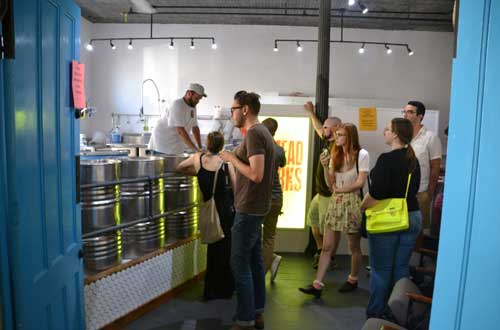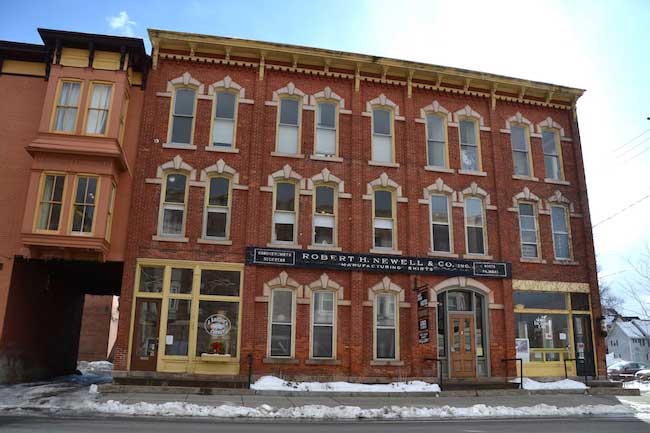Orleans EDA wants to create package for breweries and distilleries to locate in downtowns

Photos by Tom Rivers: A crowd gathers in 810 Meadworks in September 2014 during an Ale in Autumn tasting event in Medina. The village updated its zoning to allow wineries, breweries, distilleries, cideries and meaderies to be allowed uses in the Downtown Historic District.
The Orleans Economic Development Agency sees the success of many microbreweries and distilleries in historic buildings in other communities.
In Batavia, the Eli Fish Brewing Company will open soon in a former Newberry’s building in the downtown.
In Wilson, the Woodcock Brothers Brewing Co. has become a big attraction in Wilson, Niagara County. Other projects in Western New York are emerging, including an effort to establish a microbrewery and restaurant in an old firehouse in Buffalo.
Orleans County already has a similar success story. 810 Meadworks opened in November 2014 in part of the historic Newell building on West Center Street. Bryan and LaRissa DeGraw operate the business out of space that was most recently a barber shop.
The DeGraws produce mead on site and have a tasting room. Meads are alcoholic drinks made by fermenting honey with water and often fruits, spices, grains and hops.
The Village of Medina had to change its zoning to allow onsite production in the historic district.
The Orleans EDA wants to encourage more similar-type processing facilities. Jim Whipple, chief executive officer of the EDA, said the historic buildings have proven ideal venues for the businesses.

810 Meadworks is located in part of the first floor at 113 West Center St., the R.H. Newell building.
The EDA wants to develop an incentive package for distilleries and micro-breweries, which can attract people to the downtowns, and give other businesses a boost.
The EDA also is willing to work with local governments on adopting zoning to encourage the projects. The EDA wants to partner with local officials to identify buildings for the breweries and distilleries and help to develop a marketing plan to attract potential developers for the businesses, Whipple said.
The agency’s board of directors discussed the issue during Friday’s monthly meeting. Right now the EDA is in the beginning stages. Whipple said he is hopeful other village and town leaders will show an interest in the initiative and work with the EDA.
Medina discussed the issue for several months before revising its zoning ordinance in June 2014. Medina’s zoning now allows for wineries and microbreweries in the historic district and the ordinance gives the village more oversight on the businesses.
The revised regulations state that wineries, breweries, distilleries, cideries and meaderies will all be allowed uses in the Downtown Historic District. The village doesn’t limit those businesses to the downtown. They are also be allowed in the General Business District as well as the Light Industrial and Industrial Zones.
The owners of the businesses will need to secure a Special Use Permit. That gives the village more say in the operations for odor, storage, noise and other issues.







































































